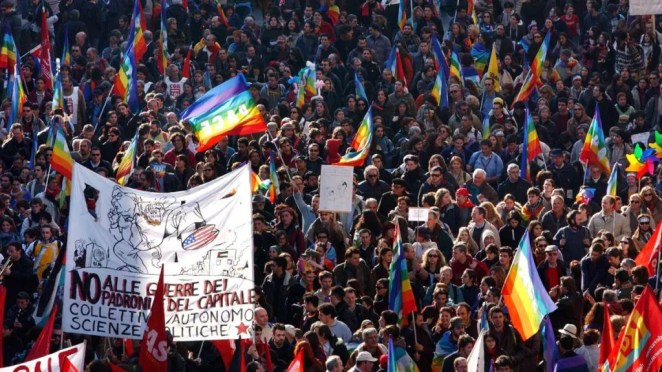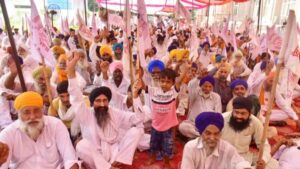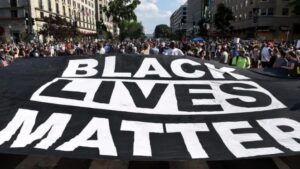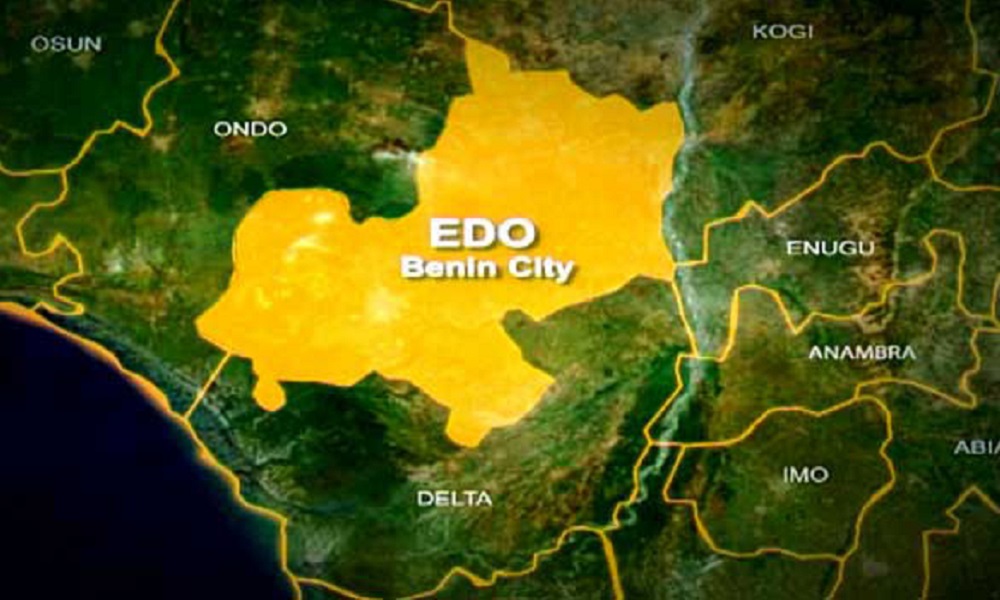News
10 biggest protests in history

Throughout history, some of the largest protests have played a crucial role in challenging unjust laws, holding governments accountable, and promoting change. At times, these demonstrations have mobilized massive crowds, becoming pivotal moments in world history.
Even though not all major protests achieve their goals, they leave a lasting impact on society, frequently inspiring similar movements around the world and across generations.
Here are ten notable protests in modern history amid the demonstrations in Nigeria and United Kingdom.
1. Indian Farmers Protest (2020-2021)

Image credit: Getty/ Hindustan Times
The Indian farmers’ protest began in late 2020, with farmers from Punjab, Haryana, and Uttar Pradesh protesting against three farm bills passed by the Indian government. The bills were seen as favoring large corporations over small farmers, leading to widespread demonstrations across the country. The protests, marked by massive rallies and a prolonged sit-in at the Delhi border, drew international attention and resulted in the repeal of the controversial laws in November 2021.
2. George Floyd and Black Lives Matter (2020)

Image credit: Getty/ OLIVIER DOULIERY)
The murder of George Floyd by a police officer in Minneapolis on May 25, 2020, sparked global outrage and a wave of protests under the banner of Black Lives Matter (BLM). Demonstrators took to the streets across the U.S. and worldwide, demanding justice for Floyd and addressing systemic racism and police brutality. The protests reignited conversations on racial inequality and led to calls for reform in policing practices.
3. Women’s March (2017)

image credit: Getty/ Bettmann
The Women’s March, held on January 21, 2017, was one of the largest single-day protests in U.S. history. In response to Donald Trump’s inauguration as President, millions of people—primarily women but including supporters of all genders—gathered in Washington, D.C., and cities around the world. The march focused on advocating for women’s rights, LGBTQ+ rights, and racial equality, and became an important moment in the broader women’s rights movement.
4. Anti-Iraq War Protests (2003)

credit: Getty Images News)
On February 15, 2003, millions of people worldwide protested against the impending U.S.-led invasion of Iraq. The demonstrations took place in major cities globally, including London, New York, and Sydney. The protests reflected widespread opposition to the war, which many viewed as unjust and based on questionable evidence. This global outcry had a major impact on public opinion and policy discussions regarding the Iraq War.
5. Tiananmen Square (1989)

(Image credit: Getty/ Archive Photos
The Tiananmen Square protests began in April 1989 with student-led demonstrations in Beijing calling for political reform, freedom of speech, and other democratic ideals. The movement grew into a mass protest involving millions. The Chinese government’s violent crackdown in June, known as the Tiananmen Square Massacre, resulted in numerous deaths and remains a sensitive and censored topic in China.
6. The Baltic Way (1989)
On August 23, 1989, approximately two million people formed a human chain spanning over 600 kilometers across the Baltic states of Estonia, Latvia, and Lithuania. Known as the Baltic Way, this peaceful protest marked the 50th anniversary of the Molotov-Ribbentrop Pact, which led to the occupation of the Baltic states by the Soviet Union. The demonstration was a powerful call for independence and played an influential role in the eventual dissolution of the Soviet Union.
7. People’s Protest (1986)
The EDSA People Power Revolution of 1986 in the Philippines was a non-violent protest that led to the end of Ferdinand Marcos’s 20-year authoritarian rule. Over four days, millions of Filipinos gathered along Epifanio de los Santos Avenue (EDSA) in Metro Manila, calling for democratic reforms and an end to corruption. The peaceful uprising, marked by mass demonstrations, prayers, and human chains, resulted in Marcos fleeing the country and Corazon Aquino, the opposition leader’s widow, being inaugurated as president, restoring democracy in the Philippines.
8. Earth Day (1970)

(Image credit: Getty)
The first Earth Day, held on April 22, 1970, was a major environmental protest that drew millions of Americans to advocate for environmental protection and raise awareness about pollution and ecological issues. Founded by Senator Gaylord Nelson, Earth Day played a crucial role in the establishment of the U.S. Environmental Protection Agency and the passage of key environmental legislation.
9. France in May (1968)

Image credit: Getty/ Michael Ochs Archives
The May 1968 protests in France were a series of student-led demonstrations and general strikes that challenged the political and social order. The movement, which began at universities and spread to involve workers and intellectuals, called for educational reform, labor rights, and broader societal changes. The protests had a lasting impact on French society and politics.
10. The Salt March (1930)
The Salt March, led by Mahatma Gandhi, was a 240-mile march to the Arabian Sea to protest British colonial rule in India. Starting on March 12, 1930, Gandhi and his followers aimed to defy British salt laws by producing salt from the sea. The march garnered massive international attention and was a crucial event in the Indian independence movement, highlighting the effectiveness of nonviolent resistance.
THIS STORY FIRST APPEARED IN VANGUARD
News
SAD! Woman, child electrocuted in Edo

A 32-year-old woman has been reportedly electrocuted by a cable belonging to the Benin Electricity Distribution Company (BEDC).
The woman and her baby were said to be electrocuted to death by a cable beneath a flooded road she was walking on after a heavy downpour.
The incident was said to have occurred on May 7th, 2025 at the Oregbeni area of Benin City, Edo State capital.
The woman, identified as Sarah David, was said to have had her baby strapped on her back when the tragedy occurred.
The cable was said to have fallen from one of the electricity poles in the neighborhood.
An eyewitness who simply identified herself as Edugie said: “the woman was also walking with a toddler believed to be her eldest child when the tragedy struck.
But for a passer-by who quickly rescued the toddler from the water, the entire family would have been wiped out.
“But for a passer-by who quickly rescued the toddler from the water, the entire family would have been wiped out.
“After the incident, some residents in the area called on the authorities of the Benin Electricity Distribution company (BEDC) to interrupt electricity supply to the area after which the corpses were removed from the flooded area.
The incident occurred on May 7th, 2025 at the Oregbeni axis of the Benin-Agbor Road,” the witness stated.
The husband of the deceased woman, Mr Samuel Ibom David bemoaned the death of his wife and baby.
He appealed to members of the public to assist him with funds to pay his late wife bride price and enable him approach her family for proper burial.
The management of Benin Disco were yet to respond to the tragedy at the time of filing this report on Sunday evening.
News
10th House extraordinarily proactive, productive for two years – Speaker Abbas

The Speaker of the House of Representatives Hon. Abbas Tajudeen, has said the 10th House has been proactive and productive since its inauguration almost two years ago.
Speaker Abbas also noted that the Legislative Agenda of the 10th, with far-reaching and ambitious proposals and targets, has produced results.
The Speaker made this known in Abuja on Monday at the inaugural Policy Dialogue on the Legislative Agenda of the House, which had top government officials and organisations at the federal and state levels in attendance. The private sector and the diplomatic corps were also represented.
The event was organised by the Office of the Speaker in conjunction with the Policy and Legal Advocacy Centre (PLAC); the National Assembly Library Trust Fund (NALTF), and the UK International Development.
Speaker Abbas said: “Two years later, I am proud to report that these efforts have yielded results. In terms of legislative output, this House has been extraordinarily proactive and productive. We have introduced a record number of bills and a volume of legislative proposals that is unprecedented at this stage of any assembly.
“More important than quantity, however, is the impact: these bills and motions are geared towards the critical reforms our country urgently needs. Already, many of the significant bills that we passed have received presidential assent.”
The Speaker said the dialogue is “a clear demonstration of our shared effort to promote parliamentary accountability, transparency, and a truly citizen-driven legislature.”
While recalling how the 10th pledged to regularly engage with Nigerians, report on its performance, and adjust its course based on the people’s feedback, the Speaker noted that the dialogue is part of that promise, “serving as a precursor to the upcoming Open NASS Week, where we open our doors to scrutiny and present our midterm progress.”
Speaker Abbas emphasised that the goal of the event is not only to celebrate the House’s achievements but also to candidly examine areas for improvement in the spirit of openness and democratic inclusion. He said that as the House prepares to mark the midpoint of its tenure, it is significant to reflect on its journey so far.
He said: “When the 10th House was inaugurated in June 2023, Nigeria faced significant challenges. The economy was weak, and there were pressing development and security crises. The populace was understandably frustrated and lost hope in democracy’s ability to meet their aspirations. This was followed by the shock of the removal of fuel subsidies, which exacerbated economic hardships and increased public anxiety. We recognised that extraordinary times required an extraordinary response from the legislature.
“Therefore, from the onset, the House dedicated itself to creating and implementing the most ambitious legislative agenda in our history. Designed to deliver good governance, this agenda aims to restore hope in democracy for our people.”
Speaker Abbas pointed out that the Legislative Agenda was not crafted in isolation but a product of extensive consultations with key stakeholders, including ministries and agencies, civil society, and development partners. He recalled how the House produced a comprehensive roadmap to guide its law-making, oversight, and representation from 2023 to 2027.
The Speaker stressed that the House took special care to align its priorities with the ‘Renewed Hope Agenda’ of the President Bola Ahmed Tinubu-led administration, ensuring synergy between the legislative and executive arms of government.
“Thus, our agenda embodies collaborative governance by engaging in dialogue with the Executive. This approach allows us to fulfil our independent mandate while ensuring that our legislative actions support national objectives and address the pressing needs of our citizens,” he stated.
Speaker Abbas explained that the agenda encompasses eight broad priority areas that address Nigeria’s diverse needs. These include strengthening good governance, enhancing national security, revitalising the economy, reforming our laws, and promoting social development. It also advocates for inclusion through an open parliament, directs foreign policy in the national interest, and tackles climate and environmental sustainability.
He said: “Never has a House of Representatives set such an expansive and forward-looking legislative blueprint. The impact the 10th House has made thus far is largely due to the deliberate, strategic, and focused execution of this agenda. We have remained focused and resilient in pursuing these goals, even when unforeseen issues arose.
“We backed our plan with concrete implementation strategies. Each House committee integrated the agenda into its work plans; we established clear milestones and key performance indicators to track progress, and we set up special committees to monitor and evaluate how well we are meeting our targets.
“We also insisted on better communication and regular reporting, which included requiring members to maintain functional constituency offices and report on their engagement with the public, ensuring accountability at every step.”
He added: “Crucially, our agenda was designed with the flexibility to respond to emerging crises. This means that even as new challenges have arisen, we have adapted swiftly without losing sight of our long-term goals. In short, we did not simply announce an ambitious agenda and hope for the best; we put in place the mechanisms and political will to implement it.”
When it comes to representation, Speaker Abbas stated that the members have endeavoured to make the 10th House “a citizen-driven legislature in practice, not just in words.” He said: “In every major endeavour, we have actively sought the people’s voice.”
News
UK unions slam Govt’s decision to end care worker visas

Labour unions and stakeholders in the United Kingdom’s care sector have come out strongly against the government’s move to stop the recruitment of foreign care workers, describing it as a reckless policy that could cripple the already struggling industry.
According to The Guardian UK, the UK government is set to publish a new immigration white paper on Monday, which includes plans to ban the recruitment of care workers from abroad.
This move is part of broader efforts by the government to cut down on legal migration and shift focus to local labour.
The announcement has drawn sharp criticism from unions and industry leaders, who argue that the care sector — already battling manpower shortages and funding challenges — heavily depends on foreign workers to function.
Reacting to the development, Professor Martin Green, CEO of Care England, lamented that the government’s decision amounts to “kicking the sector while it’s already down.”
For years now, we’ve been surviving on limited resources, rising operational costs, and serious staffing gaps,” Green said. “International recruitment may not have solved all the problems, but it provided a much-needed lifeline.
Taking that away now without offering any support or alternative is simply heartless.”
The UK’s largest trade union, Unison, also condemned the policy and demanded immediate clarification on the fate of foreign care workers already in the country.
Unison General Secretary, Christina McAnea, noted that the UK’s healthcare and social care systems would have collapsed without the input of migrant workers.
“Thousands of migrant health and care workers have kept things running. Now, they are left confused and anxious about their future. The government needs to assure them they’ll not be kicked out,” she stated.
McAnea also criticised the government for tagging care roles as “low-skilled”, insisting that the sector deserves better pay and recognition.
Figures show that in 2023 alone, over 58,000 foreign care workers entered the UK through the skilled worker visa route — accounting for nearly half of new entrants into the care workforce.
Meanwhile, the Labour government has defended the decision, describing it as part of a reset of the immigration system designed to reduce dependency on foreign labour and invest in British workers.
Home Secretary Yvette Cooper, speaking during a BBC interview, insisted that there are still untapped pools of labour within the UK.
“Employers should be looking to hire from those already in the UK, including people on existing visas who are yet to be deployed,” she said. “There’s also room to extend some visas, but we believe it’s time to draw the curtain on recruiting new care workers from abroad.”
The policy continues to stir debate across the UK, with fears that it could worsen the staffing crisis in the care sector and increase pressure on families already struggling to access quality care services.
-

 News19 hours ago
News19 hours agoWho Is Usoro Akpabio? Tinubu’s New MD for South-South Development Commission
-

 News11 hours ago
News11 hours agoJust in: Wike admits Fubara alongside 2 govs visited him on reconciliatory moves
-

 Politics19 hours ago
Politics19 hours agoJust in: PDP leaders plan to grab power as govs, ex-govs meet
-

 Politics19 hours ago
Politics19 hours agoWatch moment Wike arrives for PDP meeting (Video)
-

 News14 hours ago
News14 hours agoRivers crisis: Wike’s aide mocks Fubara, advises him to honourably quit since his spirit has left Brick House
-

 News19 hours ago
News19 hours agoTrue confession: “I’m not keen to return to office my spirit has left Brick House-Fubara
-

 Economy13 hours ago
Economy13 hours agoSEE Black Market Dollar (USD) To Naira (NGN) Exchange Rate Today 12th May 2025
-

 News8 hours ago
News8 hours agoGo home to face corruption probe, protesters in London tell Kyari (Photos)






